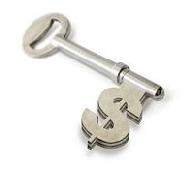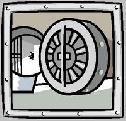
 |
|
| Financial Terms | |
| Bank |
|
Information about financial, finance, business, accounting, payroll, inventory, investment, money, inventory control, stock trading, financial advisor, tax advisor, credit.
Main Page: financial, accounting, stock trading, inventory, payroll, inventory control, credit, investment, |
Definition of Bank
BankMoney in a bank cheque account, the difference between receipts and payments.
Related Terms:Agency bankA form of organization commonly used by foreign banks to enter the U.S. market. An agency BAN (Bank anticipation notes)Notes issued by states and municipalities to obtain interim financing for Bank collection floatThe time that elapses between when a check is deposited into a bank account and when the funds are available to the depositor, during which period the bank is collecting payment from the payer's bank. Bank discount basisA convention used for quoting bids and offers for treasury bills in terms of annualized Bank draftA draft addressed to a bank. Bank lineLine of credit granted by a bank to a customer. Bank wireA computer message system linking major banks. It is used not for effecting payments, but as a  Banker's acceptanceA short-term credit investment created by a non-financial firm and guaranteed by a Bank for International Settlements (BIS)An international bank headquartered in Basel, Switzerland, which BankruptcyState of being unable to pay debts. Thus, the ownership of the firm's assets is transferred from Bankruptcy cost viewThe argument that expected indirect and direct bankruptcy costs offset the other Bankruptcy riskThe risk that a firm will be unable to meet its debt obligations. Also referred to as default or insolvency risk. Bankruptcy viewThe argument that expected bankruptcy costs preclude firms from being financed entirely Clearing House Interbank Payments System (CHIPS)An international wire transfer system for high-value Consortium banksA merchant banking subsidiary set up by several banks that may or may not be of the Eligible bankers' acceptancesIn the BA market, an acceptance may be referred to as eligible because it is  EurobankA bank that regularly accepts foreign currency denominated deposits and makes foreign currency loans. Export-Import Bank (Ex-Im Bank)The U.S. federal government agency that extends trade credits to U.S. Federal Financing BankA federal institution that lends to a wide array of federal credit agencies funds it Federal Home Loan BanksThe institutions that regulate and lend to savings and loan associations. The Foreign banking marketThat portion of domestic bank loans supplied to foreigners for use abroad. International Bank for Reconstruction and Development - IBRD or World BankInternational bank for Reconstruction and Development makes loans at nearly conventional terms to countries for projects of high International Banking Facility (IBF)International banking Facility. A branch that an American bank Investment bankFinancial intermediaries who perform a variety of services, including aiding in the sale of Legal bankruptcyA legal proceeding for liquidating or reorganizing a business. Merchant bankA British term for a bank that specializes not in lending out its own funds, but in providing Money center banksbanks that raise most of their funds from the domestic and international money markets, relying less on depositors for funds.  PIBOR (Paris Interbank Offer Rate)The deposit rate on interbank transactions in the Eurocurrency market Prepackaged bankruptcyA bankruptcy in which a debtor and its creditors pre-negotiate a plan or Society for Worldwide Interbank Financial Telecommunications (SWIFT)A dedicated computer network to support funds transfer messages internationally between over 900 member banks worldwide. Wholesale mortgage bankingThe purchasing of loans originated by others, with the servicing rights World BankA multilateral development finance agency created by the 1944 Bretton Woods, New Bank overdraftMoney owed to the bank in a cheque account where payments exceed receipts. Bank reconciliationThe process of taking the balances from the bank statement and the general ledger and making adjustments so that they agree. Bank reconciliationA comparison between the cash position recorded on a company’s bankruptcyThe reorganization or liquidation of a firm that cannot pay its debts. concentration bankingSystem whereby customers make payments to a regional collection center which transfers funds to Central BankA public agency responsible for regulating and controlling an economy's monetary and financial institutions. It is the sole money-issuing authority. Commercial BankA privately owned, profit-seeking firm that accepts deposits and makes loans. Federal Reserve BanksThe twelve district banks in the Federal Reserve System. Fractional Reserve BankingA banking system in which banks hold only a fraction of their outstanding deposits in cash or on deposit with the central bank. Investment BankerMiddleman between a corporation issuing new securities and the public. The middleman buys the securities issue outright and then resells it to customers. Also called an underwriter. World BankThe International bank for Reconstruction and Development, an international organization that provides long-term loans to developing countries to improve their infrastructure. Bankers AcceptancesA bill of exchange, or draft, drawn by the borrower for payment on a specified date, and accepted by a chartered bank. Upon acceptance, the bill becomes, in effect, a postdated certified cheque. Merchant BankA financial institution that engages in investment banking functions, such as advising clients in mergers and acquisitions, underwriting securities and taking debt or equity positions. ABM (automated banking machine)A bank machine, sometimes referred to as an automated teller machine (ATM). bank draftA guaranteed form of payment which is issued in amounts over $5,000. Absolute priorityRule in bankruptcy proceedings whereby senior creditors are required to be paid in full American Depositary Receipts (ADRs)Certificates issued by a U.S. depositary bank, representing foreign Automated Clearing House (ACH)A collection of 32 regional electronic interbank networks used to Automatic stayThe restricting of liability holders from collection efforts of collateral seizure, which is Back-to-back financingAn intercompany loan channeled through a bank. Baker PlanA plan by U.S. Treasury Secretary James Baker under which 15 principal middle-income debtor BaneIn the words of Warren Buffet, Bill Bane Sr., is, "a great American and one of the last real traders BookA banker or trader's positions. Book-entry securitiesThe Treasury and federal agencies are moving to a book-entry system in which securities are not represented by engraved pieces of paper but are maintained in computerized records at the British clearersThe large clearing banks that dominate deposit taking and short-term lending in the domestic Bullet loanA bank term loan that calls for no amortization. Call money rateAlso called the broker loan rate , the interest rate that banks charge brokers to finance Canadian agenciesAgency banks established by Canadian banks in the U.S. Capital market imperfections viewThe view that issuing debt is generally valuable but that the firm's CashThe value of assets that can be converted into cash immediately, as reported by a company. Usually Cash and equivalentsThe value of assets that can be converted into cash immediately, as reported by a Cash-equivalent itemsTemporary investments of currently excess cash in short-term, high-quality Certificate of deposit (CD)Also called a time deposit, this is a certificate issued by a bank or thrift that Chinese wallCommunication barrier between financiers (investment bankers) and traders. This barrier is Clearing House Automated Payments System (CHAPS)A computerized clearing system for sterling funds ComangerA bank that ranks just below a lead manager in a syndicated Eurocredit or international bond Commercial riskThe risk that a foreign debtor will be unable to pay its debts because of business events, Commitment feeA fee paid to a commercial bank in return for its legal commitment to lend funds that have Compensating balanceAn excess balance that is left in a bank to provide indirect compensation for loans Conditional sales contractsSimilar to equipment trust certificates except that the lender is either the Corporate processing floatThe time that elapses between receipt of payment from a customer and the CramdownThe ability of the bankruptcy court to confirm a plan of reorganization over the objections of Dealer loanOvernight, collateralized loan made to a dealer financing his position by borrowing from a Debt securitiesIOUs created through loan-type transactions - commercial paper, bank CDs, bills, bonds, and Debt swapA set of transactions (also called a debt-equity swap) in which a firm buys a country's dollar bank Debtor in possessionA firm that is continuing to operate under Chapter 11 bankruptcy process. Debtor-in-possession financingNew debt obtained by a firm during the Chapter 11 bankruptcy process. Delivery versus paymentA transaction in which the buyer's payment for securities is due at the time of Demand line of creditA bank line of credit that enables a customer to borrow on a daily or on-demand basis. Depository transfer check (DTC)Check made out directly by a local bank to a particular firm or person. Disbursement floatA decrease in book cash but no immediate change in bank cash, generated by checks Discount rateThe interest rate that the Federal Reserve charges a bank to borrow funds when a bank is Discount windowFacility provided by the Fed enabling member banks to borrow reserves against collateral Documented discount notesCommercial paper backed by normal bank lines plus a letter of credit from a Edge corporationsSpecialized banking institutions, authorized and chartered by the Federal Reserve Board Either/or facilityAn agreement permitting a bank customer to borrow either domestic dollars from the Either-way marketIn the interbank Eurodollar deposit market, an either-way market is one in which the bid Electronic depository transfersThe transfer of funds between bank accounts through the Automated Euro CDsCDs issued by a U.S. bank branch or foreign bank located outside the U.S. Almost all Euro CDs Euro linesLines of credit granted by banks (foreign or foreign branches of U.S. banks) for Eurocurrencies. EuroclearOne of two principal clearing systems in the Eurobond market. It began operations in 1968, is EurocreditsIntermediate-term loans of Eurocurrencies made by banking syndicates to corporate and Eurocurrency depositA short-term fixed rate time deposit denominated in a currency other than the local Eurocurrency marketThe money market for borrowing and lending currencies that are held in the form of EurodollarThis is an American dollar that has been deposited in a European bank or an U.S. bank branch Fair-and-equitable testA set of requirements for a plan of reorganization to be approved by the bankruptcy court. FCIAForeign Credit Insurance Association. A private U.S. consortium of insurance companies that offers Related to : financial, finance, business, accounting, payroll, inventory, investment, money, inventory control, stock trading, financial advisor, tax advisor, credit. |